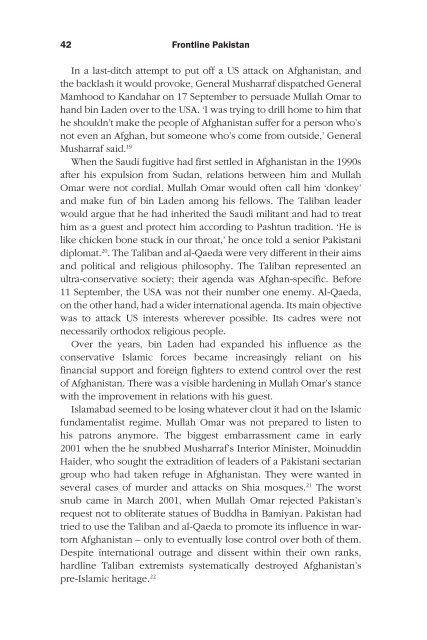Frontline Pakistan : The Struggle With Militant Islam - Arz-e-Pak
Frontline Pakistan : The Struggle With Militant Islam - Arz-e-Pak
Frontline Pakistan : The Struggle With Militant Islam - Arz-e-Pak
Create successful ePaper yourself
Turn your PDF publications into a flip-book with our unique Google optimized e-Paper software.
<strong>Frontline</strong> <strong><strong>Pak</strong>istan</strong><br />
In a last-ditch attempt to put off a US attack on Afghanistan, and<br />
the backlash it would provoke, General Musharraf dispatched General<br />
Mamhood to Kandahar on 17 September to persuade Mullah Omar to<br />
hand bin Laden over to the USA. ‘I was trying to drill home to him that<br />
he shouldn’t make the people of Afghanistan suffer for a person who’s<br />
not even an Afghan, but someone who’s come from outside,’ General<br />
Musharraf said. 19<br />
When the Saudi fugitive had first settled in Afghanistan in the 1990s<br />
after his expulsion from Sudan, relations between him and Mullah<br />
Omar were not cordial. Mullah Omar would often call him ‘donkey’<br />
and make fun of bin Laden among his fellows. <strong>The</strong> Taliban leader<br />
would argue that he had inherited the Saudi militant and had to treat<br />
him as a guest and protect him according to Pashtun tradition. ‘He is<br />
like chicken bone stuck in our throat,’ he once told a senior <strong><strong>Pak</strong>istan</strong>i<br />
diplomat. 20 . <strong>The</strong> Taliban and al-Qaeda were very different in their aims<br />
and political and religious philosophy. <strong>The</strong> Taliban represented an<br />
ultra-conservative society; their agenda was Afghan-specific. Before<br />
11 September, the USA was not their number one enemy. Al-Qaeda,<br />
on the other hand, had a wider international agenda. Its main objective<br />
was to attack US interests wherever possible. Its cadres were not<br />
necessarily orthodox religious people.<br />
Over the years, bin Laden had expanded his influence as the<br />
conservative <strong>Islam</strong>ic forces became increasingly reliant on his<br />
financial support and foreign fighters to extend control over the rest<br />
of Afghanistan. <strong>The</strong>re was a visible hardening in Mullah Omar’s stance<br />
with the improvement in relations with his guest.<br />
<strong>Islam</strong>abad seemed to be losing whatever clout it had on the <strong>Islam</strong>ic<br />
fundamentalist regime. Mullah Omar was not prepared to listen to<br />
his patrons anymore. <strong>The</strong> biggest embarrassment came in early<br />
2001 when the he snubbed Musharraf’s Interior Minister, Moinuddin<br />
Haider, who sought the extradition of leaders of a <strong><strong>Pak</strong>istan</strong>i sectarian<br />
group who had taken refuge in Afghanistan. <strong>The</strong>y were wanted in<br />
several cases of murder and attacks on Shia mosques. 21 <strong>The</strong> worst<br />
snub came in March 2001, when Mullah Omar rejected <strong><strong>Pak</strong>istan</strong>’s<br />
request not to obliterate statues of Buddha in Bamiyan. <strong><strong>Pak</strong>istan</strong> had<br />
tried to use the Taliban and al-Qaeda to promote its influence in wartorn<br />
Afghanistan – only to eventually lose control over both of them.<br />
Despite international outrage and dissent within their own ranks,<br />
hardline Taliban extremists systematically destroyed Afghanistan’s<br />
pre-<strong>Islam</strong>ic heritage. 22













